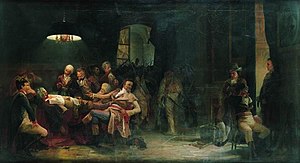- Bienvenu, Richard, ed. The ninth of Thermidor: the fall of Robespierre (Oxford University Press, 1968)
- Brown, Howard G. "Robespierre's Tail: The Possibilities of Justice after the Terror Arxivat 2020-08-25 a Wayback Machine.." Canadian Journal of History (2010) 45#3 (anglès)
- Cobban, Alfred. "The Fundamental Ideas of Robespierre," English Historical Review Vol. 63, No. 246 (January 1948), pp. 29–51 JSTOR
- Cobban, Alfred. "The Political Ideas of Maximilien Robespierre during the Period of the Convention," English Historical Review Vol. 61, No. 239 (January 1946), pp. 45–80 in JSTOR
- Durant Will and Ariel Durant. The Age of Napoleon, New York:Simon and Schuster (1975) outdated popular history
- Hibbert, Christopher Paris in the Terror New York: Dorset Press (1981).
- Linton, Marisa. "Robespierre and the Terror", History Today, August 2006, Volume 56, Issue 8, pp. 23–29
- Linton, Marisa, Choosing Terror: Virtue, Friendship and Authenticity in the French Revolution (Oxford University Press, 2013).
- McPhee, Peter. Robespierre: A Revolutionary Life. Yale University Press, 2012. ISBN 0300118112. ; scholarly biography
- Neely, Sylvia. A Concise History of the French Revolution (2008)
- Palmer, R. R.. Twelve Who Ruled: The Year of Terror in the French Revolution. Princeton University Press, 1941. ISBN 0-691-05119-4. A study of the Committee of Public Safety
- Rudé, George. Robespierre: Portrait of a Revolutionary Democrat. Nova York: Viking Press, 1976. ISBN 0-670-60128-4. A Marxist political portrait of Robespierre, examining his changing imatgeamong historians and the different aspects of Robespierre as an 'ideologue', as a political democrat, as a social democrat, as a practitioner of revolution, as a politician and as a popular leader/leader of revolution, it also touches on his legacy for the future revolutionary leaders Vladimir Lenin and Mao Zedong.
- Schama, Simon. Citizens: A Chronicle of the French Revolution. Nova York: Alfred A. Knopf, 1989. ISBN 0-394-55948-7. A revisionist account.
- Scurr, Ruth. Fatal Purity: Robespierre and the French Revolution. London: Metropolitan Books, 2006 (ISBN 0-8050-7987-4).
- Shulim, Joseph I. "Robespierre and the French Revolution," American Historical Review (1977) 82#1 pp. 20–38 in JSTOR
- Soboul, Albert. "Robespierre and the Popular Movement of 1793–4", Past and Present, No. 5. (May, 1954), p. 54–70. in JSTOR
- Sutherland, D.M.G. The French Revolution and Empire: The Quest for a Civic Order (2003)
- Thompson, James M.. Robespierre. Oxford: Blackwell Publishers, 1988. ISBN 0-631-15504-X. Traditional biography with extensive and reliable research.
- Bouloiseau Marc, La republique Jacobin (10 août 1792 - 9 thermidor an II). Paris. (1972) (francès)
- Brunel Françoise, Thermidor, la chute de Robespierre, Ed. Complexe (1989). (francès)
- Domecq Jean Philippe, Robespierre, derniers temps, Seuil (1984). (francès)
- Frère Jean-Claude, Robespierre, la victoire ou la mort, Flammarion (1983).
- Madelin Louis, Fouché, de la Révolution à l'Empire, tome 1, Nouveau Monde Editions, Reedition (2002)
- Mathiez Albert, Autour de Robespierre, Payot (francès)
- Mathiez Albert, Robespierre terroriste, (1921) (francès)
- Mathiez Albert, Etudes sur Robespierre, S.E.R.(1927) (francès)
- Robespierre Maximilien, Discours et rapports à la Convention, Ed. 10/18 (1965).
- Robespierre Maximilien, Textes choisis, Ed. Sociales (1973) (francès)
- Sollet Bertrand, Robespierre, Messidor (1988) (francès)
